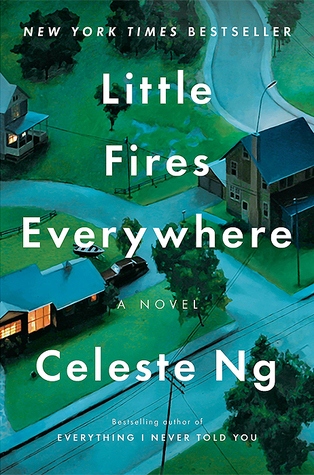[January 2019]
Little Fires Everywhere
Celeste Ng
Average rating: 8.5333
Highest rating: 9.25
Lowest rating: 7.5
Number of voters: 6
Percentage of voters who finished the book: 100
In case you're wondering: The title is literal. Little Fires Everywhere blazes out of the starting gate with the burning of the Richardson home, with literal fires everywhere. From there, the novel is a retrospective of how a thousand tiny sparks burst into a thousand figurative fires that ignite a teenage girl's desire to burn down her own house.
Also in case you're wondering: I haven't spoiled anything by telling you how it all ends. One of the joys of Ng's writing is that even when you know how it ends—maybe because you know how it ends—you want to know how the author and the characters will get there.
And it's quite the journey. Touching on issues of privilege, race, and class, Ng focuses most tightly on what makes a mother. (Hint: There are many ways to be a mother. Also: There are many way a mother can abandon her children.*)
Little Fires Everywhere isn't a perfect book. Some of us wanted more character development. Others felt the plot pushed believability in places. But in spite a few little flaws, Little Fires Everywhere is can't-put-it-down, harrowing tale of survival in the suburbs. No one walks away without getting singed.
*Quote credit to Emily! Again!
Pachinko
[December 2018]
Pachinko
Min Jin Lee
Average rating: 8.394
Highest rating: 9
Lowest rating: 7.5
Number of voters: 8
Percentage of voters who finished the book: 100
Holiday party menu: kimchi, mochi, and lots of yummy treats!
**********
Pachinko is, to put it simply, a really sad story beautifully told.* Simultaneously instructional and riveting, it is a sweeping saga of several generations of Korean immigrants making their way in Japan through much of the 20th century.
Min Jin Lee writes characters with depth and insight, asking nothing of the reader but to hear their stories—yet telling those stories so richly that we wouldn't think of turning away. These characters draw us in and cause us in turns to love them and to loathe them, but almost always to root for them.
There is an element of historical fiction in Pachinko, as major events of the 20th century impact the family in ways both expected and unexpected. But the book never loses the feel of being a novel.
Pachinko is moving, angering, entertaining, shocking, educating, and utterly riveting. To put it simply, it is a really sad story beautifully told.
(Content disclaimer: Several in our group found the sexual content gratuitous, so consider yourself warmed.)
*Quote of the night! Thanks for the good material, Emily!
Subscribe to:
Comments (Atom)


